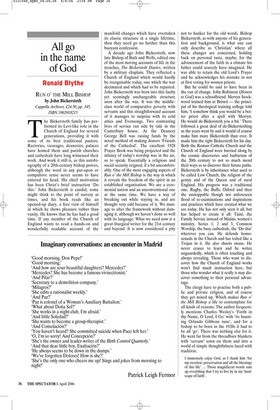All go in the name of God
Ronald Blythe
RUN O’ THE MILL BISHOP by John Bickersteth Cappella Archives, £24.50, pp. 345, ISBN 1902918215 The Bickersteth family has performed its Levi-like role in the Church of England for several generations, providing it with some of its best traditional pastors. Rectories, vicarages, deaneries, palaces have homed them and parish churches and cathedrals have long witnessed their work. And work it still is, as this autobiography of a 20th-century bishop proves, although the word in any put-upon or compulsive sense never seems to have entered his head. His chief motivation has been Christ’s brief instruction ‘Do this.’ John Bickersteth is candid, some might think to the point of naivety at times, and his book reads like an opened-up diary, a free view of himself in which he shows pleasure rather than vanity. He knows that he has had a good time. If any member of the Church of England wants to read a hands-on and wonderfully readable account of the manifold changes which have overtaken its classic structure in a single lifetime, then they need go no further than this buoyant confession.
A decade ago John Bickersteth, now late Bishop of Bath and Wells, edited one of the most moving accounts of life in the trenches, The Bickersteth Diaries, written by a military chaplain. They reflected a Church of England which would hardly be recognisable today, one which the war decimated and which had to be repaired. John Bickersteth was born into this faulty yet seemingly unchangeable structure soon after the war. It was the middleclass world of comparative poverty with servants and this straightforward account of it manages to surprise with its cold attics and Evensongs. Two contrasting lives of service ran side by side in the Canterbury house. At the Deanery George Bell was raising funds by the novel method of making donors ‘Friends of the Cathedral’. The excellent 1928 Prayer Book was being projected and the infancy of today’s worship was in the air, so to speak. Essentially a religious and social security reigned, if a bit uncomfortably. One of the most engaging aspects of Run o’ the Mill Bishop is the way in which it reveals the freedom of the spirit in an established organisation. We are a ceremonial nation and an unconventional one at the same time. We have a way of breaking out while staying in, and are thought very odd because of it. We manage to alter the framework without damaging it, although we haven’t done so well with its language. What we need now is a great liturgical writer for the 21st century and beyond. It is now considered a pity not to hanker for the old words. Bishop Bickersteth, as with anyone of his generation and background, is what one can only describe as ‘Christian’ where all these changes are concerned, holding back on personal taste, maybe, for the advancement of the faith in a climate his father could scarcely have imagined. He was able to retain the old Lord’s Prayer and he acknowledges his mistake in not at first voting for women priests.
But he could be said to have been in the van of change. John Robinson (Honest to God) was a schoolfriend. Mervyn Stockwood trained him at Bristol — the principal of his theological training college told him, ‘I somehow think you would be a better priest after a spell with Mervyn. He would de-Bickersteth you a bit.’ There followed a great deal of de-Bickerstething as the years went by and it would of course make him more Bickersteth than ever. It made him the right Bickersteth for his day. Both the Roman Catholic Church and the Church of England were hurried along by the cosmic discoveries and barbarism of the 20th century to not so much mend their ways as to discover their future paths. Bickersteth is by inheritance what used to be called Low Church, the religion of the gentry and of the Queen and of rural England. His progress was a traditional one, Rugby, the Buffs, Oxford and then the unstoppable though not unforeseen flood of re-examinations and inspirations and practices which have created what we see today. He has not only seen it all, but has helped to create it all: Taizé, the Family Service instead of Matins, women’s ministry, Series 1, 2 and 3, Common Worship, the busy cathedrals, the ‘Do this’ wherever you can. He defends homosexuals in the Church and has toiled like a Trojan in it. He also shoots swans. He never ceases to learn and he writes unguardedly, which is often touching and always revealing. Those who want to discover how the Church of England works won’t find much instruction here, but those who wonder what it really is may discover something to their personal advantage.
The clergy have to practise both a public and private religion, and of course they get mixed up. Which makes Run o’ the Mill Bishop a life to contemplate for all kinds of reasons. The author frequently mentions Charles Wesley’s ‘Forth in thy Name, O Lord, I Go’ with ‘its haunting Orlando Gibbons tune’, and for a bishop to be born in the 1920s it had to be all ‘go’. There was nothing else for it. He went far from the threadbare blankets with ‘servant’ sown on them and into a world of simple thoughtfulness laced with tradition.
I immensely enjoy God, as I thank him ‘for my creation, preservation and all the blessings of this life’ ... Those magnificent words sum up everything that I try to live by in my ‘landscape of faith’.










































































 Previous page
Previous page